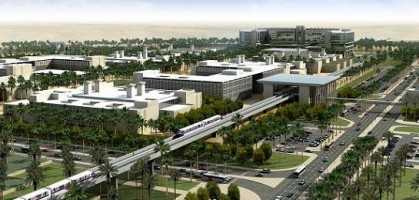Princess Noura University for Women View
Princess Noura University for Women, Riyadh, Saudi Arabia
Implementation of a large scale solar thermal district application to provide for space heating and hot water needs of the Princess Nora University for Women in Saudi Arabia (PNUW). The University Campus has to supply 40.000 students, 13 faculties, lecturers and university personnel, dormitories, research facilities and a gymnasium. The area supplied with hot water and space heating even comprises a hospital and hotel along with all other necessary infrastructure for living, working and studying. The implementation of the solar system should lower the capital cost, lower operational and maintenance cost, support the saving of conventional fuels and provide safer operation.
The Challenges of this actual case study are the arid desert conditions with possible severe sandstorms generating fine dust and the desert climate where it can be very hot during the day and very cold, sometimes freezing during the night. The sandstorms generating fine dust require the system to be built sealed and in addition the cleaning process should be easy and not altogether time consuming. The complexity of excess heat has to be resolved since in summer there is no need for space heating and during vacation periods the demand of hot is much lower. Because of a freezing probability during the cold desert nights the system and solutions will have to be tested to withstand low ambient temperature. The size of the project causes challenges in space allocation and uncertainty of solar input because of weather conditions. Integration with sophisticated Building Management Systems (BMS) has to be implemented. Easy and simple transfer of technology to the customer should be achieved. Saving of carbon emission gained by saving on fuel consumption.
With a solid background and engineering experience, identification of the customer needs for the project and the analysis of the given facts for the supply of domestic hot water and space heating during the 40 heating days in Riyadh, are conducted and a solar supported district heating network is installed. The demand of heat is covered by oil fired boilers with a peak load capacity of 70 MWth together with a 25 MWth generated from 36.305m2 of flat plate collectors especially designed to withstand harsh desert conditions with low maintenance needs. The collectors are placed on the rooftop of a 60.000m2 warehouse. During the summer period the thermal load of the district heating network is calculated to be 30MWth.




